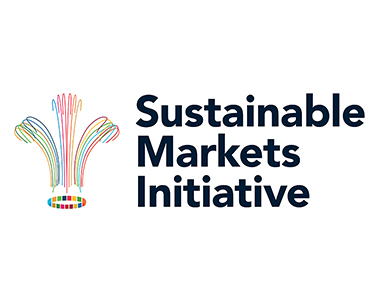“The reality facing all business is that it’s becoming increasingly difficult for nature to sustain us,” says His Majesty King Charles III, who for more than half a century has cautioned of the perils of treating nature as an inexhaustible resource. “To move forward, we must continue to show that sustainability and profitability are not mutually exclusive.”

The environment and our global economy
As global business has advanced over the past century, it has made great strides in creating opportunity while also spurring innovations to drive social progress. Despite such achievements, industries ranging from aviation to energy to construction are faced with their greatest challenge yet as they look to the century ahead.
To move forward, we must continue to show that sustainability and profitability are not mutually exclusive.

Finding balance
In partnership with a coalition of business leaders, nonprofits and government organizations, King Charles III is leading a global effort to encourage and help entire industries rethink how they operate. The Sustainable Markets Initiative (SMI) is a CEO-led global forum through which industries innovate ways to restructure their operations in order to grow in a manner that respects and protects the world’s limited resources.
Launched in 2020, the SMI seeks to overturn a longstanding misconception that companies must choose between business success and sustainability. “We recognized that as a false choice more than a decade ago,” says Brian Moynihan, Chair and CEO of Bank of America and Chair of the SMI. “We believe that we must continue to deliver great returns while also delivering progress on social and environmental priorities.”
Across industries, the SMI aims to promote a more balanced economy, in which industries, as part of their production processes, replenish the resources they consume. “Nature’s contribution to the global economy is estimated to be worth more than $125 trillion annually,” His Majesty notes. “What profit we make, we have to also make a profit for nature by putting something back.”
To demonstrate that business can work in concert with the environment, SMI announced the Terra Carta which provides a roadmap to 2030 for businesses to move towards an ambitious and sustainable future: one that will harness the power of nature combined with the transformative power, innovation and resources of the private sector. Engagement has been swift, with more than 450 CEOs supporting the Terra Carta mandate since its launch and 300+ member CEOs joining in roundtable discussions and task forces. These SMI-led meetings have unlocked investment, spurred innovation and amplified public and private sector cooperation on addressing critical areas of focus in achieving net zero.
With more than $60 trillion in global assets managed by members of the SMI, investment at scale is beginning to take shape, including the Natural Capital Investment Alliance committing to mobilize $10 billion in investment by the end of 2022footnotei. “The Terra Carta is a comprehensive roadmap for the private sector to help drive toward a sustainable future,” said Moynihan. “By integrating sustainability into our operating models, the private sector can marshal the resources that will be needed to reach climate, biodiversity and development goals.”
The private sector can marshal the resources that will be needed to reach climate, biodiversity and development goals.

Additionally, the SMI developed Re-TV.org, a content platform available on major streaming services highlighting inspiring, real-world sustainability practices.
Serving all stakeholders
The SMI’s efforts reflect an ongoing global shift from shareholder capitalism to stakeholder capitalism, Moynihan says. While profits and shareholder value remain vital, stakeholder capitalism places a high value on environmental, social and governance (ESG) issues. Stakeholder capitalism repositions capitalism to play an essential role in solving climate change, poverty, hunger and other challenges outlined in the United Nations Sustainable Development Goals (SDGs). While the SMI looks for solutions for entire industries, another recent initiative can help individual companies reach their goals. With the International Business Council’s new Stakeholder Capitalism Metrics, businesses can measure their own progress in advancing ESG priorities in their operations.

The SMI is catalyzing rapid progress in the private sector
The SMI is catalyzing rapid progress in the private sector. More than 300 CEOs have joined the effort, collectively representing $60 trillion in assets, to realize a global economy that puts environmental sustainability at the heart of business.
January 2020
SMI launches at WEF with 10 point action plan to kickstart bold and imaginative action to accelerate global progress towards a sustainable future.
September 2020
Re:TV launches showcasing the most inspiring business innovations and ideas for a sustainable future through a series of films curated by editor-in-chief, HRH The Prince of Wales.
January 2021
Launched Natural Capital Investment Alliance, with ambition to mobilize $10bn by the end of 2022.
January 2021
The 10 point action plan evolves in to the Terra Carta and is launched as the SMI’s mandate.
June 2021
G7 announcement focuses on investment efforts across ten industry verticals aiming to drive trillions of dollars in support of a green economic transition globally.
October 2021
At the G20 summit the SMI outlines five market signals aiming to accelerate investment in the pursuit of more sustainable markets.
November 2021
The SMI convened the private sector, civil society and public sector at the first Terra Carta Action Forum at COP26 and 15 members announces commitments to the Natural Capital Investment Alliance, meeting the $10bn target.
November 2022
At COP 27 the SMI’s second Terra Carta Action Forum hosted almost fifty CEOs in roundtables and panels focused on reaching a more equitable and sustainable low-carbon future.
Growing evidence suggests companies committed to ESG tend to be more resilient and perform better financially than companies that neglect such considerations. In the same way, industries that learn to thrive and produce in a way that supports nature position themselves for long-term success. “If the true costs are taken into account,” notes His Majesty, “being socially and environmentally responsible should be the least expensive option because it leaves the smallest footprint behind.”
Through the SMI, says Moynihan, “We have created a framework to provide tangible, actionable pathways for the private sector, governments, NGOs, and others to realize the long-standing ambition to protect and preserve our planet while sharing prosperity with all.”
Work with the SMI is just one part of Bank of America’s strategy to support social and environmental progress through investment, philanthropy and responsible business operations.
Learn more about Bank of America’s commitment to advance sustainability and address some of the world’s toughest challenges through its global business strategy, work with partners, support of employees and efforts to make its operations sustainable.
Updated on 1/8/2024
